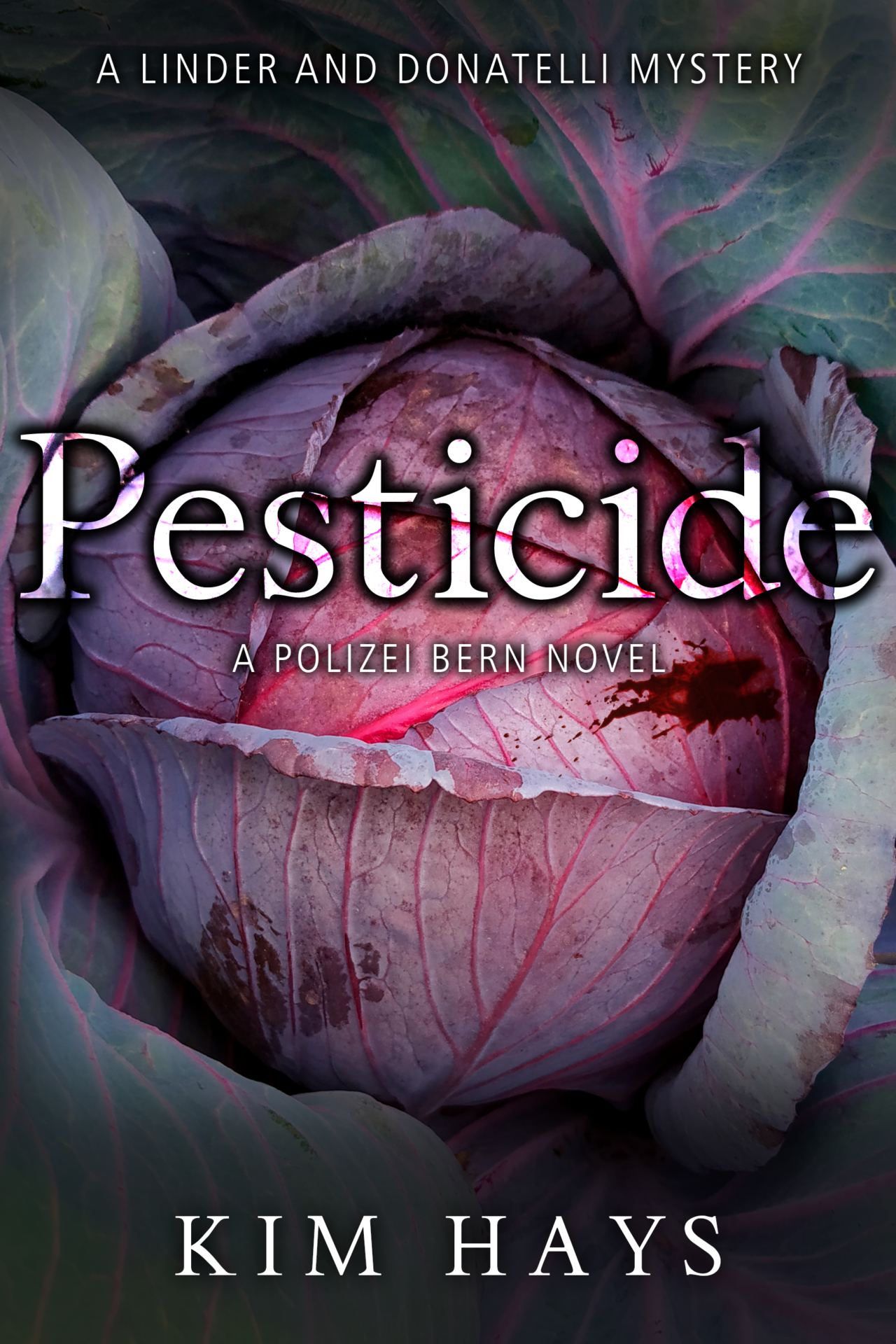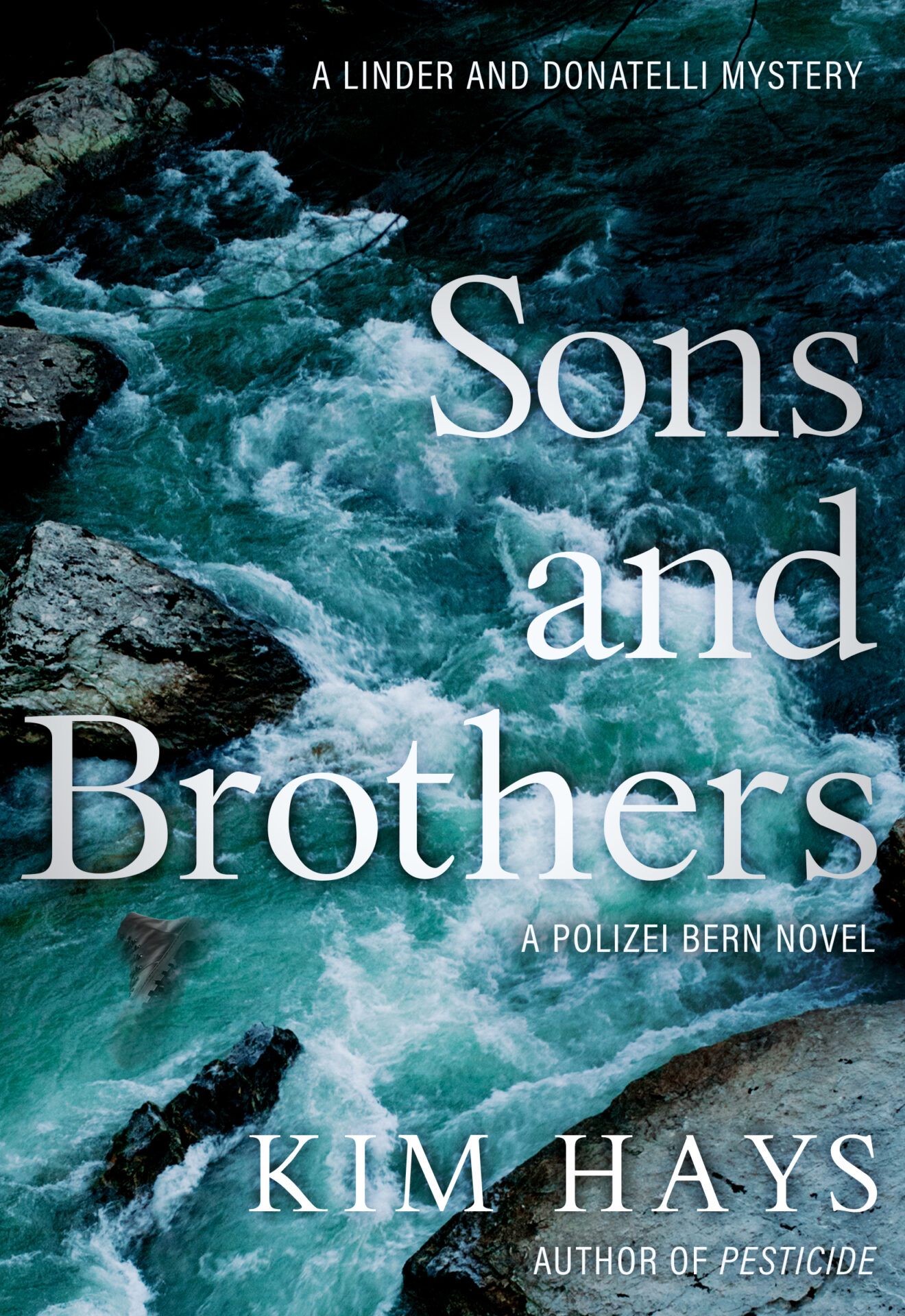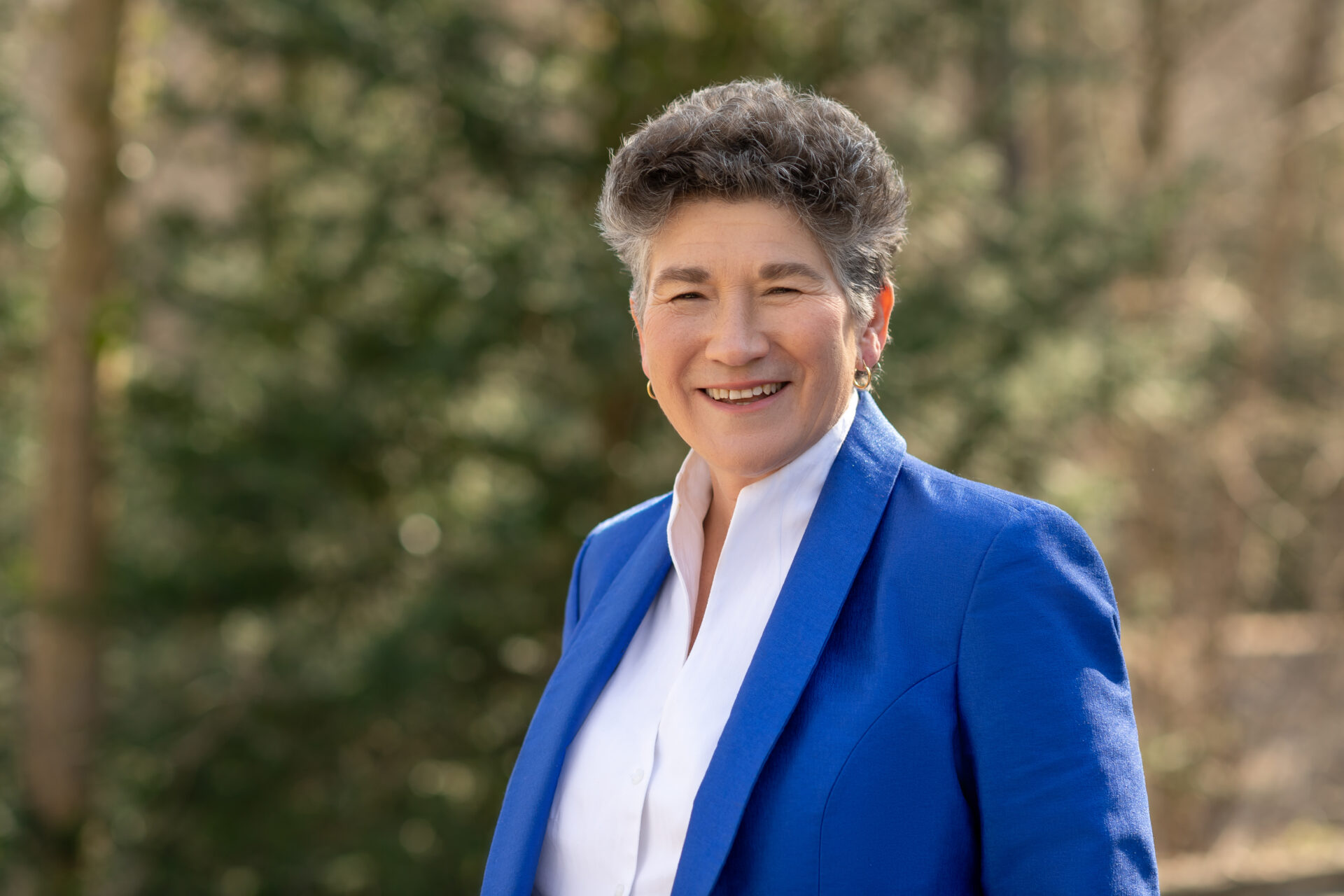Kim Hays, a graduate of Harvard and UC-Berkeley, is a mystery writer as well as a cultural sociologist. A long-time resident of Switzerland, she was born in the United States, and has lived in Canada, Puerto Rico, and Sweden. She is the author of the Polizei Bern series, including Pesticide and Sons and Brothers. In addition to receiving a starred Kirkus review, Pesticide was also shortlisted for a Debut Dagger award by the Crime Writers Association and a finalist for the 2023 Silver Falchion Award for Best Mystery by Killer Nashville. Her upcoming novel, A Fondness for Truth, is the third in the series and will be released in 2024 by Seventh Street Books.
TSM: Can you tell us a little bit about the Polizei Bern series?
KH: All the Polizei Bern mysteries are set in or around the medieval Swiss city of Bern and feature homicide detective Giuliana Linder and her younger colleague Renzo Donatelli. The two cops tackle the books’ suspicious deaths together, their points of view alternating as the stories unfold. The novels are primarily whodunits, but their settings matter, too: events take place not only in the cobblestoned streets of Bern’s Old City but along the Aare River that encircles Bern, on organic farms in the Three Lakes region, and in an Emmental village dominated by an aristocratic family. There’s romance, too. Giuliana and Renzo have spouses and children and are over ten years apart in age, but as they work together, they become attracted to each other, which creates a moral conflict, at least for Giuliana, whose family life is crucial to her.
One of my reviewers wrote, “Giuliana Linder and Renzo Donatelli are compassionate, conflicted, and utterly compelling.” That’s one of my favorite compliments.

TSM: How has your experience living in so many different places during your life influenced your storytelling?
KH: Being exposed to different cultures during my childhood and as an adult has made me think a lot about judgment. On the one hand, I’ve learned to be slow to judge attitudes and behaviors that seem strange to me. On the other hand, I’ve developed strong ideas about what I’m willing to put up with in any culture (especially as a woman), and I know how to stand up for myself. I think this has helped me write interesting police procedurals since being a good cop is all about knowing when to take your time judging a person or situation and when to act decisively—when to be understanding and when to be tough.
Both Renzo and Giuliana, different as they are from each other, live by strong principles while attempting (and occasionally failing) to remain open-minded. They also try to face the dilemmas their jobs and personal lives throw at them instead of taking refuge in denial.
TSM: In your blog post “Stephen King Meets Georgette Heyer,” you talk about how you have recently started to read some of Stephen King’s novels. As a hardcore King fan myself, what is your favorite novel that you have read by him and why? What aspects of his writing do you most admire?
KH: Since you’re a King fan, you know he has written sixty-five novels, and I’ve barely scratched the surface with the seven I’ve read or listened to. Of these, my favorite is 11/22/63, about a man going back in time to stop the Kennedy assassination. Like anything by King, the book is can’t-put-it-down exciting. It also introduced me to an intriguing hero, gave me fascinating information about Lee Harvey Oswald and his times, and confronted me with gripping moral problems.
Many writers only shine at some aspects of writing a good novel, but King can do everything: set a tremendous pace, create appealing characters, and make us think. Above all, I like how satisfied I feel when I finish one of his books, long or short. Sometimes I gallop through thrillers because they are exciting, but when I finish them, I’m disappointed. Meh! What a forgettable book, I think. So far, that’s never been true with a King novel.
TSM: In the same blog post, you talk about literary fiction vs. genre fiction. In your opinion, why do you think people tend to categorize literary fiction as “good” and genre fiction as “bad?”
KH: I think it’s a learned behavior passed on by parents and teachers, and it’s very sad because it discourages reading and promotes snobbery. Young people should grow up reading whatever they want to read—well, maybe not the novels of the Marquis de Sade at the age of ten, but you know what I mean. How else can people figure out what books give them the most pleasure and provide the best mental stimulus or a much-needed escape?
I’ve read many magnificently written and moving novels over the years, most recently Barbara Kingsolver’s Demon Copperhead. Still, it’s genre fiction, especially mysteries, sci-fi, and fantasy, that I read over and over for entertainment and comfort.
TSM: Your novel Pesticide was shortlisted for a Debut Dagger award by the Crime Writers Association and received a starred Kirkus review. The second novel, Sons and Brothers, came out in 2023, and Julia Spencer-Fleming has called it a “must-read.” How was writing the second novel different than writing the first, knowing that it was well received? How did the positive reception of the first novel influence your mindset when you wrote the second novel?
KH: Guess what? Sons and Brothers may be my second published book, but it’s the first novel I wrote—and it remains my favorite. I revised it over and over, trying to find a publisher. After a long string of rejections, I put it aside and wrote Pesticide, which I converted into the first book in a series. I had trouble finding an agent or a publisher for it, too. (I got comments like, “Why don’t you write about a country that readers would find interesting instead of Switzerland?”) So, I went back to Sons and Brothers and finally got it right; after that, I wrote the first draft of A Fondness for Truth, the third book in the series, which will be out in 2024.
Thank you, Seventh Street Books, for publishing Pesticide and its sequels. I’m forever grateful.

TSM: Similarly, how do you handle praise? On the other hand, how do you handle criticism? Do you have any advice in terms of how to navigate praise/criticism?
KH: It took eight years of rejections before I got a contract for the first Polizei Bern book. Because of that, any praise or positive recognition that my novels receive now remains a glorious surprise rather than something to live up to. The bad years made me understand that degrees of success or failure are a matter of timing, luck, and good connections, not just good writing.
As for criticism, every writer suffers when their books are attacked; lots of us are defensive about every word we’ve ever written. But most of the criticism I’ve gotten, at least from professional editors, is ultimately constructive, so I’ve learned (and it wasn’t easy) to wait a day or two until the initial indignation has subsided and then consider the suggestion that I cut or rewrite something as unemotionally as possible. The secret to dealing well with criticism is to find an editor you respect so much that when they tell you something needs to be changed, you know deep down that there’s a 99% chance they’re right!
TSM: What’s your favorite place that you have traveled to?
KH: I’m so happy living in Switzerland that you could say it’s my favorite country in the world—I traveled to it thirty-five years ago and never left! (This doesn’t mean I don’t acknowledge and sometimes write about its faults, starting with the corrupt world of Swiss finance).
As for admiring faraway places, my husband and I spent several weeks in Uzbekistan, where we were overwhelmed by the most beautiful buildings we’d ever seen. My favorite place of all is New Zealand, where we rented a car and spent seven weeks sightseeing on both islands. Because it’s so far away, we knew from the start that our trip there was a once-in-a-lifetime event, so we made the most of it. Although New Zealand is small, it contains extraordinarily varied beauty—snowy mountains, spectacular fjords, endless beaches, deep forests, plus lava fields, hot springs, and lots of dolphins and penguins. On top of all that, there are interesting cities, great food, and delightful people.
TSM: For Pesticide, Debora Crombie wrote that you delivered “engaging and realistically drawn detectives who struggle to balance their personal lives with the demands of a gripping investigation.” How do you go about creating complex, engaging, and interesting characters?
KH: This is a difficult question, but I think at least three factors are involved. First of all, I find people’s lives fascinating, and I’m always asking my friends (and strangers, too, occasionally) to tell me what their childhoods were like, how their jobs are going, what they’ve faced with their kids, and more. I think all the stories I’ve listened to help me to produce complex characters. After all, you only need to scratch the surface of real people’s lives to discover how tangled (and sometimes terrible) those can be. Book characters can’t compare.
Second, when my writing is flowing well, I am in my characters’ heads, engrossed in what they’re doing, thinking, and feeling. Even most of my baddies have a few good qualities, or at least they have complicated motives for their crimes. My detectives Giuliana and Renzo are old friends of mine—I can’t wait to figure out what they’ll get up to. Of course, there are plenty of writing days when I just slog along beside my characters instead of running with them. But the good days are worth waiting for.
Third, some of my friends and family very generously read my drafts, and they tell me when they think one of my characters is saying or doing something silly, confusing, boring, or out-of-character. Often, we writers don’t have enough distance to recognize when we’ve made a mistake, so it helps to get different opinions.
TSM: What’s next for you? Any upcoming projects that you can tell us about? What themes/genres are you interested in writing about?
KH: The third mystery in the Polizei Bern series, A Fondness for Truth, will be out in the spring of 2024, and the fourth is almost finished, so I’m already considering topics for #5. The primary goal of all my writing is to entertain, but I try to weave a few thought-provoking topics into each novel. The four mysteries I’ve done so far have dealt with how hard it is for immigrants to adapt to new cultures, for example, plus whether a universal service for young people (a kind of national Peace Corps) is a good idea, how parents can support LGBTQ+ children, and what it means to be a good mother or father.
As long as I’m writing books for the Polizei Bern series, I’ll address aspects of Swiss everyday life and current affairs that I think US readers will find interesting, especially when they relate to topics—for example, police brutality—that are controversial in both countries. (This theme is one that’s addressed in Pesticide.)
TSM: What advice would you give to anyone trying to publish their debut novel?
KH: I’ve described how difficult it was to persist despite a mountain of rejections from agents and traditional publishers while I was working on the first three books in my series. So, it’s not surprising that my advice for writers looking for a publisher focuses on perseverance—but not at all costs. At least once a year, when I was writing and rewriting mysteries, I’d ask myself with total seriousness if it made sense to keep going. Sometimes determination is a virtue; other times, it’s a stubborn, mindless refusal to accept reality. The problem is figuring out which category your own determination falls into! I did keep going, but I never let myself believe that I had to.
Other suggestions:
Don’t start writing unless you have enough money to switch to part-time work or, at best, take a writing sabbatical. Trying to write a novel after a full day of caring for kids and a household, working for pay, OR doing both at once is killing. Still, some people manage to produce great work under those conditions. I take my hat off to them.
I think almost all writers feel insecure about their work, even after they’ve had a lot of success. Nevertheless, I don’t think anyone can survive trying to produce a novel and release it to the world’s eyes unless they have enough inner strength to keep enjoying life and feeling good about themselves, no matter how many rejections or bad reviews they get. Struggling writers should never forget that there are countless ways to feel successful and happy without publishing a novel.

